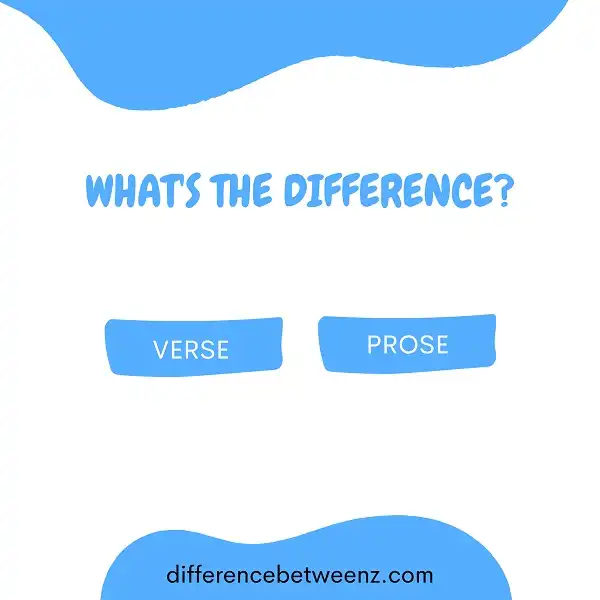There is a lot of debate surrounding the difference between verse and prose. Some people insist that there is no real distinction, while others claim that the two forms are significantly different. In order to understand the difference, it might be helpful to look at some examples of each.
What is Verse?
Verse is a type of poetry that employs a specific meter or rhythmic scheme. This scheme is often based on the number of syllables in each line, as well as the arrangement of stresses and unstressed syllables. Verse can be written in a number of different meters, and it often has a particular rhyme scheme. Though it is most commonly associated with poetry, verse can also be found in other forms of literature, such as plays and novels. In addition to serving as a means of expression, verse can also add a musical quality to the written word. As such, it has been used for centuries to tell stories, convey emotions, and communicate ideas.
What is Prose?
- Prose is a type of writing that is typically non-verse and non-metrical. Prose is often thought of as being the natural form of written language, as opposed to verse forms such as poetry or drama.
- Prose is characterized by its straightforward, declarative sentences, and its logical, well-organized structure. Prose can be either fiction or nonfiction, although it is most often associated with novels, short stories, and memoirs.
- Prose is also an important component of many academic disciplines such as history and philosophy. In fact, much of the world’s great literature is written in prose, including works by authors such as James Joyce, Virginia Woolf, and Mark Twain. Prose can be beautiful and poetic, or it can be simple and direct. It is one of the most versatile and widely used tools in the writer’s toolbox.
Difference between Verse and Prose
- Verse and prose are the two main ways that writers can choose to structure their work. Verse is writing that is structured into rhyming lines, while prose is writing that does not have a consistent rhyme scheme. Verse can be further divided into subcategories, such as poetry and lyricism.
- Prose, on the other hand, encompasses everything from novels and short stories to nonfiction works like essays and biographies. While there are many differences between verse and prose, the most important distinction is the way that they are structured.
- Verse is typically more formal than prose, and it often employs elevated language to create a sense of rhythm or meter. Prose, on the other hand, is usually more colloquial and straightforward in its approach. While both verse and prose have their own unique merits, writers ultimately have to decide which form best suits their particular project.
Conclusion
In poetry, the words are chosen for their sound and rhythm as well as their meaning. Poems also often have a structure or pattern that is followed. Prose writing, on the other hand, is written in sentences and paragraphs that follow normal grammar rules. It typically has a logical order to it and does not usually rhyme. So, what’s the difference? The biggest distinction between verse and prose is that verse is meant to be read aloud. Prose can be read aloud, but it’s not its main purpose.


